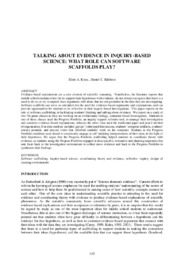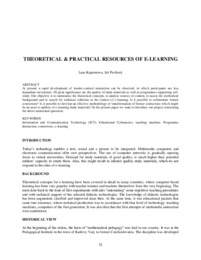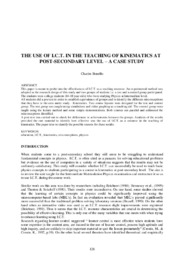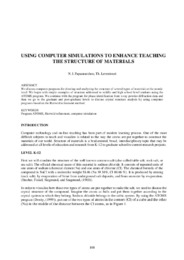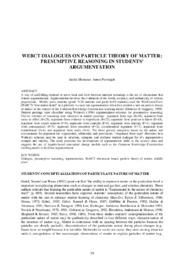Browsing CBLIS Conference Proceedings 2003 Volume II: The educational potencial of new technologies by Title
Now showing items 19-25 of 25
-
Talking about evidence in inquiry-based science: what role can software scaffolds play?
(Department of Educational Sciences, University of Cyprus, 2003)Evidence-based explanations are a core element of scientific reasoning. Nonetheless, the literature reports that middle school students often fail to support their hypotheses with evidence, do not always recognize that ... -
Theoretical & practical resources of e-learning
(Department of Educational Sciences, University of Cyprus, 2003)At present a rapid development of learner-centred instruction can be observed, in which participants are less dependent on teachers. Of great significance are the quality of study materials as well as programmes supporting ... -
The use of I.C.T. in the teaching of kinematics at post-secondary level – a case study
(Department of Educational Sciences, University of Cyprus, 2003)This paper is meant to probe into the effectiveness of I.C.T. as a teaching resource. An experimental method was adopted as the research design of this study and two groups of students i.e. a test and a control group ... -
The use of mind mapping software to improve primary school students’ ability to construct scientific arguments
(Department of Educational Sciences, University of Cyprus, 2003)The purpose of this study was to examine elementary school students’ ability to construct scientific arguments. We set out to analyze students’ arguments in aspects of structure and validity of claims, before and after ... -
Using an interactive simulation to enhance procedural skills in grade 5
(Department of Educational Sciences, University of Cyprus, 2003)The discrepancy between what we teach and what scientists and citizens need is greater than most instructors realise. Science for citizenship and science in the technical workplace, both involve greater emphasis on procedural ... -
Using computer simulations to enhance teaching the structure of materials
(Department of Educational Sciences, University of Cyprus, 2003)We discuss computer programs for drawing and analyzing the structure of several types of materials at the atomic level. We begin with simple examples of structure addressed to middle and high school-level students using ... -
WebCT dialogues on particle theory of matter: presumptive reasoning in students’ argumentation
(Department of Educational Sciences, University of Cyprus, 2003)A way of scaffolding students to move back and forth between multiple meanings is the use of discussions that feature argumentation. Argumentation involves the evaluation of the worth, accuracy, and authenticity of various ...
